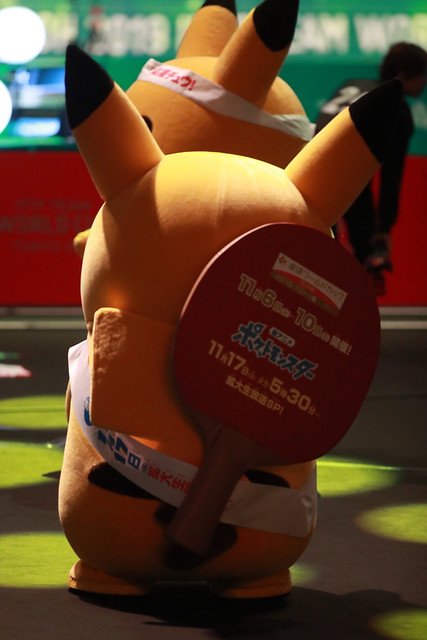by Ian Marshall, Editor
In the men’s team final, Jang Woojin, Jeoung Youngsik and Lee Sangsu proved most worthy opponents for the Chinese trio comprising Fan Zhendong, Liang Jingkun and Xu Xin.
The desire to cause a major upset evident, in the opening contest Jeoung Youngsik and Lee Sangsu recovered from a two games to nil deficit and the brink of defeat in the third, to overcome Liang Jingkun and Xu Xin by the very narrowest of margins (8-11, 4-11, 12-10, 11-7, 12-10).
Equally, in the third match of the fixture, Jeoung Youngsik came within a whisker of beating Liang Jingkun; he led by two games to one and was on the precipice on victory in the fourth, prior to experiencing defeat (11-9, 8-11, 10-12, 15-13, 11-8).

Reliability
Success for Liang Jingkun on his debut in the Team World Cup but in any such event, the coach needs a player on whom he can rely totally. Turn back the clock a decade, I am sure that when Liu Guoliang was the Chinese national coach, he had every faith in Ma Lin; in Tokyo, Qin Zhijian, the incumbent adviser, placed is confidence in Fan Zhendong.
Duly, Fan Zhendong, safe, secure and reliable, steadied the ship. In the second match of the fixture, he beat Jang Woojin in straight games (11-8, 11-8, 11-9), in the fourth he overcame Lee Sangsu in similar style to bring matters to and end (11-8, 11-4, 11-8).
Once again the incredible depth of the Chinese team was illustrated; one big win against the odds, to succeed you must follow with two more. Simply note the names of the players not selected for the final, Ma Long, the reigning Olympic and World champion, Lin Gaoyuan, listed at no.3 on the current world rankings and surely for any other team in the world an automatic selection!

Resigned to bench
Likewise, in the women’s event Ding Ning and Wang Manyu were resigned to the bench; coach Li Sun selected Chen Meng, Liu Shiwen and Sun Yingsha; for Japan the order read Miu Hirano, Kasumi Ishikawa and Mima Ito.
Liu Shiwen underlined the reasons why she was crowned world champion earlier this year in April and emerged the world cup winner more recently in October. She partnered Chen Meng to doubles success against Miu Hirano and Kasumi Ishikawa (11-7, 11-9, 12-10), before in the third match of the fixture beating Miu Hirano (11-3, 11-8, 11-5) to conclude matters.
However, sandwiched in between there was a classic; Sun Yingsha recovered from a two games to nil deficit to beat Mima Ito, saving three consecutive match points in the deciding game before emerging victorious (8-11, 9-11, 11-6, 11-7, 12-10); the sheer top spin consistency of Sun Yingsha, able to change the pace of the play, a crucial factor.

Dominance
Overall, since the tournament was first staged in 1990 in Japan; now 12 editions, China has won the men’s title 10 times, the women’s one more. Only once has China not secured the women’s crown; that was in Nîmes in 1994 when Russia’s Galina Melnik, Irina Palina and Elena Timina prevailed.
Meanwhile, for the men, the Swedish trio of Mikael Appelgren, Jörgen Persson and Jan-Ove Waldner succeeded in 1990 in Tokyo; in 1995 in Atlanta Korea Republic’s Kim Taeksoo, Lee Chulseung and Yoo Namkyu emerged the winners.
It is now for the Chinese men, eight consecutive wins, nine for the women; since 2007 when the tournament returned to the calendar in Magdeburg after a 12 year absence, now all eight editions in both men’s and women’s events have been won by China.
Likewise, since the team events were introduced into the Olympic Games in 2008 in Beijing, always the titles have gone to China; there are challengers to the hegemony but the evidence from the ZEN-NOH 2019 Team World Cup is that all have steps to climb, several steps, the top step is very much the preserve of China.









